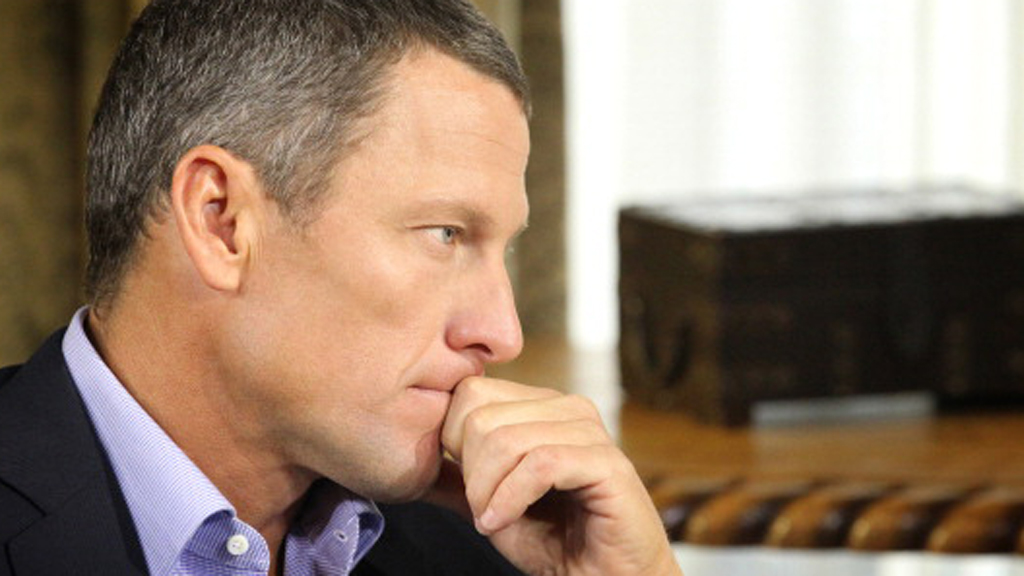Lance Armstrong admits doping to Oprah
As Lance Armstrong admits doping in an interview with US talk-show host Oprah Winfrey, journalist David Walsh – who investigated the doping allegations – gives his verdict to Channel 4 News.
The American cyclist started the interview by admitting that he had used performance-enhancing drugs in all seven of the Tour de France races that he won and that he had used EPO, blood transfusions and other drugs such as testosterone.
However, in the 90-minute interview, the first of two episodes being broadcast on the Oprah Winfrey Network, Armstrong denied a United States Anti-Doping Agency finding that he had been the lead figure in the “most sophisticated, professionalised and successful doping programme that sport has ever seen”, that he had pressurised other riders into doping or face being kicked off the team, and that he had doped in his comeback in 1999.
I didn’t invent the culture, but I didn’t try to stop the culture – Lance Armstrong
Oprah Winfrey, known for hosting celebrity confessionals, opened the interview at Armstrong’s Texas home by asking “Did you ever take banned substances to enhance cycling performance?” to which Armstrong answered “Yes.”
Vindication
Channel 4 News ventured to the home of David Walsh, the journalist who, over more than a decade, investigated doping allegations against Armstrong. The investigation led to the Sunday Times being sued by Armstrong for libel – a case that was settled out of court.
Mr Walsh said that he felt the interview was done “on his terms, not on the terms that some people would want.” He complained that the interview lacked detail about how the doping was done.
He also spoke about why Armstrong agreed to the interview, in his view to rebuild his brand in the US, and about Armstrong’s treatment of people who opposed him – specifically US Postal Team soigneur Emma O’Reilly.
Watch comments from Mr Walsh below, and see more on Friday’s Channel 4 News.
Cheat
However, he added that he did not think it was “humanly possible” to have won the Tour de France, the pinnacle of international competitive cycling, seven times without cheating.
He said at the time of the doping he did not feel like it was wrong, he did not feel bad about it, and he did not feel like it was cheating. He said he felt he was creating a level playing field with other cyclists who were doping.
“I went and looked up the definition of cheat,” he said. “And the definition is to gain an advantage on a rival or foe. I didn’t view it that way. I viewed it as a level playing field.”
Read more: What does Lance Armstrong get out of appearing on Oprah?
“I didn’t invent the culture, but I didn’t try to stop the culture,” he had said earlier. It is only now, he said, after seeing the anger from his fans, that he was “beginning to understand” the scale of his wrongdoing.
Armstrong said: “I’ll spend the rest of my life trying to earn back trust and trying to apologise to people. For the rest of my life.
“I see the anger in people. And betrayal. It’s all there. These are people that supported me, believed in me. They have every right to feel betrayed. And it’s my fault.”

‘Ruthless desire’
Explaining his reasons for cheating, Armstrong said he had developed a “ruthless desire to win” when fighting testicular cancer, and this had carried across into cycling. “That was bad,” he said.
However, he also denied a number of allegations levelled at him. Whilst admitting that he was “a bully” because “I try and control the narrative”, he denied that he had threatened to fire people from the US Postal Service cycling team if they did not dope.
He also said one of the most hurtful things for him was the suggestion that he doped in the 2009 Tour de France, in which he finished in third place.
“The last time I crossed that line was 2005,” he said. “That’s the only thing in that whole (USADA) report that really upset me.”
He also said he regreted the comeback because “we wouldn’t be sitting here” if he had not returned to the sport.
Response
A survey of Channel 4 News Twitter followers found most people were not impressed by Armstrong’s interview, with followers saying it did not change their opinion of him, that he did not appear remorseful, and that he was light on specifics.
@channel4news No more than a well rehearsed Mea Culpa. He cheated everyone, even Oprah herself during several interviews. Not to be trusted
— Hannibal Chew (@zzzzleeper) January 18, 2013
However, there were some who sympathised. Daniel Croft wrote that Armstrong came across as “honest and remorseful”.
“He was the best of his generation and his generation used performance enhancing drugs,” he tweeted.
Olympic gold medallist Sir Matthew Pinsent was scathing of the interview, saying Oprah was too easy on Armstrong, and that the cyclist dodged questions with ease.
If that was live it would have been fine-but its recorded, edited & polished. far far too much miss over hit from Oprah for me. Sorry O fans
— Matthew Pinsent (@matthewcpinsent) January 18, 2013
The interview will be repeated on the Discovery Channel at 8pm on Friday.